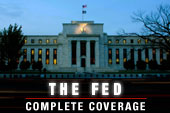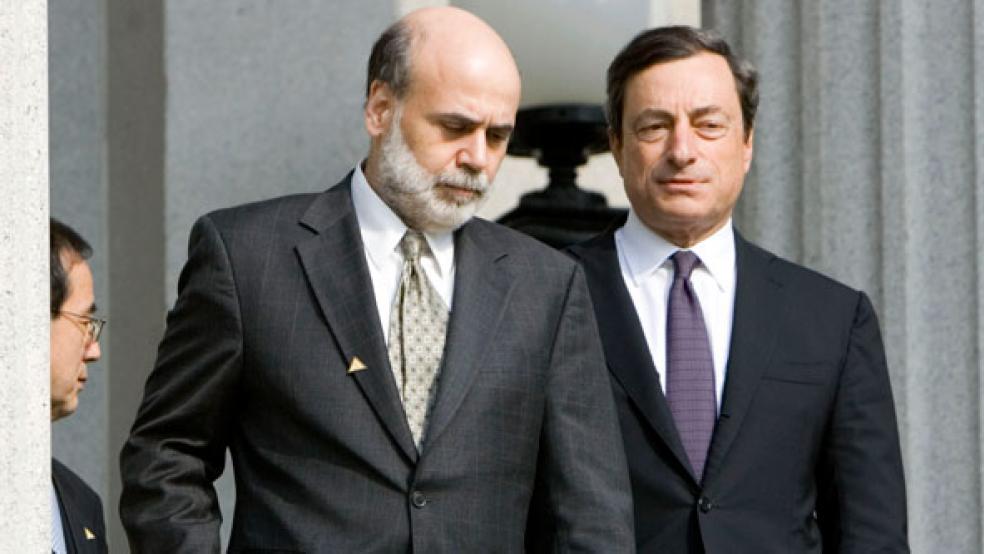The unprecedented action initiated by the Federal Reserve last month – its open-ended third round of quantitative easing – has been highly controversial in many quarters. So much so that Fed Chairman Ben Bernanke tackled the issue head-on at the Economic Club of Indiana yesterday.

In a speech titled “Five Questions about the Federal Reserve and Monetary Policy,” Bernanke tried to counter claims that the Fed’s commitment to low interest rates means that the federal government gets to borrow more cheaply and rack up an even higher level of debt, or that the Fed is “monetizing” that debt through its securities purchases. “Using monetary policy to try to influence the political debate on the budget would be highly inappropriate,” Bernanke told his audience. (He added that it also probably wouldn’t work.)
The catalyst for the Fed’s actions is what is happening – or rather, not happening – in the job market, where the unemployment rate remains north of 8 percent in spite of clear signs many job seekers have given up their quest and left the employment market altogether.
RELATED: Fed's QE3 Turns Safe Investments into Losers
“Though the economy has been growing since mid-2009 and we expect it to continue to expand, it simply has not been growing fast enough recently to make significant progress in bringing down unemployment,” Bernanke said. “While unemployment has been stubbornly high, our economy has enjoyed broad price stability for some time, and we expect inflation to remain low for the foreseeable future. So the case seemed clear to most of my colleagues that we could do more to assist economic growth and the job market without compromising our goal of price stability.”
In the wake of previous recessions, from 1973 through to the end of the 20th century, data shows that employment levels had returned to pre-crisis levels within 2.5 years of their pre-recession peak. Even after the recession of 2001, the job market went back to normal more rapidly than it has today, although it took closer to 3.5 years before the employment levels recovered. Today? We are further away from returning to the high levels of employment recorded in late 2007 than we have been in any post-recession period – and we’re nearly five years out from that peak. This is, as Bernanke has pointed out, uncharted territory.
It isn’t just the Fed that is breaking new ground. The European Central Bank was created with a narrower mandate than that of the Fed or other central banks, being charged with maintaining price stability. Until Mario Draghi took over at the helm of the ECB nearly a year ago, the central bank was largely inactive in the midst of Europe’s massive fiscal crisis, even as it spread and deepened.
Draghi has taken a creative approach to justifying a wider role for the ECB in trying to contain the crisis, arguing that while the fate of the Euro remains in doubt and the Eurozone stays so fragmented, pursuing price stability is pointless. In order to fulfill that mandate, he implies, the ECB will have to put a stop to trends – like the soaring yields on euro-denominated debt issued by countries like Spain and Italy – that jeopardize its ability to fulfill that core mandate. Hence, Draghi’s famous pledge to do “whatever it takes” to protect the Euro, including bond purchases.
Both Bernanke and Draghi have attracted criticism for their actions – but both central bank leaders may well feel they have been forced to act by the inaction or ineffective action by legislators and policymakers. In Europe, politicians have been horrifyingly slow to acknowledge that they will need to adopt some kind of new paradigm and then undertake radical new initiatives if they are to save the common currency and shield the stronger members of the Eurozone from the consequences of defaults by nations on the periphery.
Under Bernanke, the Fed has injected more than $1 trillion into the U.S. economy since the beginning of the financial crisis in 2008. But extraordinary times beget extraordinary actions, and, to some extent, at least, those actions were shaped by past inaction on the part of both regulators and policymakers, who failed to identify or contain the looming risks within the financial system.
Should a central bank play such a prolonged and central role in an economic recovery, going well beyond the traditional measure of simply adjusting interest rates? Those who argue “no” will have to ponder the apparent reluctance or inability of policymakers to reach agreement on key fiscal policy issues.
Bernanke left the fiscal questions to Congress and the administration, but he did push back on the notion that the Fed is enabling further ballooning of the national debt. “Even though our activities are likely to result in a lower national debt over the long term, I sometimes hear the complaint that the Federal Reserve is enabling bad fiscal policy by keeping interest rates very low and thereby making it cheaper for the federal government to borrow,” the Fed chairman said. “I find this argument unpersuasive.”
Bernanke also suggested that raising interest rates to discourage further federal borrowing could backfire. “Such an action would substantially increase the deficit, not only because of higher interest rates, but also because the weaker recovery that would result from premature monetary tightening would further widen the gap between spending and revenues,” he said. “It seems likely that a significant widening of the deficit – which would make the needed fiscal actions even more difficult and painful – would worsen rather than improve the prospects for a comprehensive fiscal solution.”
During times of economic crisis or difficulty, the central bank should be a player in helping to reach a solution. The abdication of responsibility on the part of legislators has made central bankers the major players, at least for now, in both Europe and the United States.
Bernanke’s attempts to combat the anemic economy and the moribund job creation market may or may not prove too costly; they may or may not succeed in their goals. But those who criticize the Fed’s decision to become more activist may want to ensure that they are consistent and logical, and direct some of their ire at policymakers of all stripes, many of whom appear to prefer gridlock to action and who have no trouble ceding much of the heavy lifting to the Fed.






